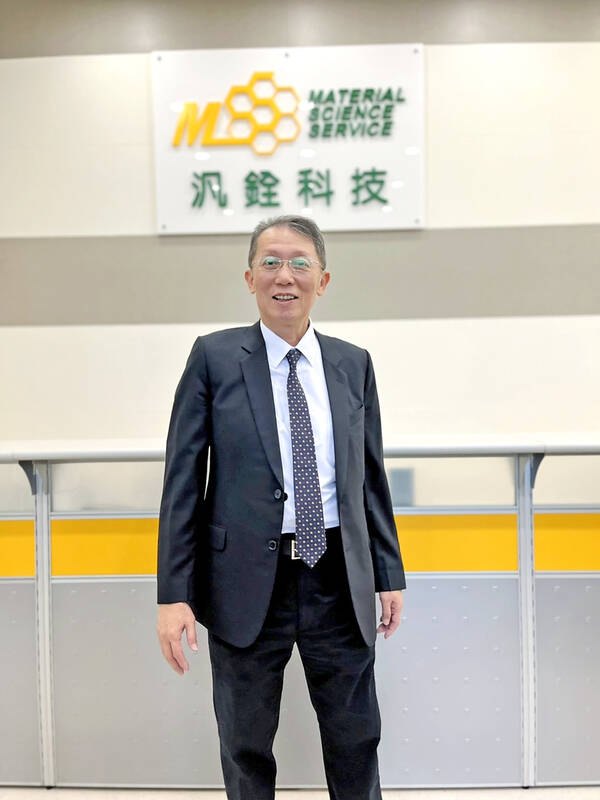Msscorps Co (汎銓科技), which specializes in materials analysis for Taiwan Semiconductor Manufacturing Co (台積電) and other semiconductor firms, yesterday said it plans to expand its capacity by 30 percent this year amid rising analysis demand for materials used in advanced technologies in Taiwan and Japan.
Strong demand for advanced semiconductor technologies helped back the company during an industry down cycle last year, Msscorps said.
To maintain its growth momentum, the company yesterday inaugurated a new plant at Tai Yuen Hi-Tech Industrial Park (台元科技園區) in Hsinchu County’s Jhubei City (竹北).

Photo: Grace Hung, Taipei Times
The new factory is to add 20 to 30 percent to its capacity in Taiwan, mostly for advanced technologies such as 2-nanometer equipment, the company said.
As new materials and new transistor architecture, dubbed gate-all-around, are adopted for the next generation of semiconductor technology, demand for materials analysis is on the rise, it said.
Msscorps two years ago ordered 30 pieces of equipment for NT$1.5 billion (US$48.37 million) and expects to receive about half of the machines this year, company chairman Gino Leou (柳紀綸) told a news conference.
The deliveries were delayed last year due to labor shortages and insufficient plant space, Leou said.
Msscorps aims to make Taiwan its biggest operational hub by capacity, contributing 75 percent of the company’s total capacity, following installation of the new equipment, he said.
As countries are racing to build local supply of advanced chips, Msscorps is stepping up its overseas deployment this year, he said.
The company plans to begin operations at a new factory near Tokyo in the third quarter of this year after three years of evaluations, Leou said, adding that the Japanese plant is expected to contribute 5 to 6 percent of the firm’s total capacity in its first year.
In China, Msscorps is also expanding capacity at an annual pace of about 50 percent as Chinese semiconductor firms proceed with aggressive technology advancement to overcome chip restrictions imposed by the US, he said.
Msscorps hopes to translate most of the capacity expansion into a new revenue stream this year, hopefully boosting revenue growth to outpace last year’s momentum, he said.
Apart from robust demand for advanced technologies, a recovery in semiconductor demand is also expected to fuel growth in the second half of this year, he said.
In the first 11 months of last year, revenue expanded 10.88 percent year-on-year to NT$1.72 billion.
About 85 percent of the company’s revenue came from materials analysis services, while failure analysis services accounted for 15 percent, the company said.

With an approval rating of just two percent, Peruvian President Dina Boluarte might be the world’s most unpopular leader, according to pollsters. Protests greeted her rise to power 29 months ago, and have marked her entire term — joined by assorted scandals, investigations, controversies and a surge in gang violence. The 63-year-old is the target of a dozen probes, including for her alleged failure to declare gifts of luxury jewels and watches, a scandal inevitably dubbed “Rolexgate.” She is also under the microscope for a two-week undeclared absence for nose surgery — which she insists was medical, not cosmetic — and is

GROWING CONCERN: Some senior Trump administration officials opposed the UAE expansion over fears that another TSMC project could jeopardize its US investment Taiwan Semiconductor Manufacturing Co (TSMC, 台積電) is evaluating building an advanced production facility in the United Arab Emirates (UAE) and has discussed the possibility with officials in US President Donald Trump’s administration, people familiar with the matter said, in a potentially major bet on the Middle East that would only come to fruition with Washington’s approval. The company has had multiple meetings in the past few months with US Special Envoy to the Middle East Steve Witkoff and officials from MGX, an influential investment vehicle overseen by the UAE president’s brother, the people said. The conversations are a continuation of talks that

CAUTIOUS RECOVERY: While the manufacturing sector returned to growth amid the US-China trade truce, firms remain wary as uncertainty clouds the outlook, the CIER said The local manufacturing sector returned to expansion last month, as the official purchasing managers’ index (PMI) rose 2.1 points to 51.0, driven by a temporary easing in US-China trade tensions, the Chung-Hua Institution for Economic Research (CIER, 中華經濟研究院) said yesterday. The PMI gauges the health of the manufacturing industry, with readings above 50 indicating expansion and those below 50 signaling contraction. “Firms are not as pessimistic as they were in April, but they remain far from optimistic,” CIER president Lien Hsien-ming (連賢明) said at a news conference. The full impact of US tariff decisions is unlikely to become clear until later this month

Nintendo Co hopes to match the runaway success of the Switch when its leveled-up new console hits shelves on Thursday, with strong early sales expected despite the gadget’s high price. Featuring a bigger screen and more processing power, the Switch 2 is an upgrade to its predecessor, which has sold 152 million units since launching in 2017 — making it the third-best-selling video game console of all time. However, despite buzz among fans and robust demand for pre-orders, headwinds for Nintendo include uncertainty over US trade tariffs and whether enough people are willing to shell out. The Switch 2 “is priced relatively high”